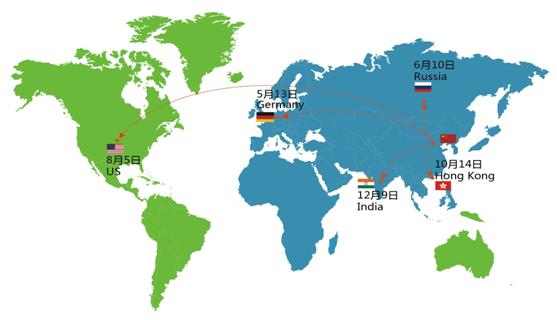境外税制系列——走进俄罗斯
活动简介

F-Council境外税制系列活动力邀安永会计师事务所在华及各地区税务专家对各地区/国家关键税制及税收问题进行解读,为企业全球税务战略实施扫除障碍。
既德国税制后,本期F-Council将就俄罗斯税制进行详细解读。
本期价值要点:
—俄罗斯通常税务考量关键点
—俄罗斯税收体制解读(利润税、增值税、个人税收、关税、税收优惠、税务合规及税务征管上的要求)
—中国企业会涉及的俄罗斯税务问题(转让定价、反避税趋势与措施、税务亏损限制性抵扣原则、商业实质要求等)
俄罗斯课税简介:
俄罗斯居民企业就全国收入征税。在俄设立企业的形式有:代表处、常设机构、分公司、子公司。俄罗斯近几年税制发生了重大的变化,整体是一个趋紧的形式。从13年开始会有较密集的税务稽查。对于不遵从当地税法的惩罚将被上升刑法的层面。目前俄罗斯也在讨论是否要加入OECD成员国,未来趋于与国际接轨。如若中资企业去当地投资无论从设立形式到架构再到当地的运营都需要做好功课,才能避免在税务上的损失。
企业同行对于俄罗斯税制的需求及困惑:
—俄罗斯位于欧亚大陆的北部,地跨东欧北亚,税制兼具欧亚两州特性,相对复杂,投资环境看不清。
—即使交易双方都在俄罗斯登记的纳税人,该交易仍有可能受到调整。“市场价格”的概念在某些方面不同于经合组织的“独立交易原则”的概念,导致在俄企业与国外关联及母公司交易间存在大量风险。
—我司北亚区将有相当一部分与俄间的边境贸易,希望能了解俄进出口关税制度及相关优惠税收。
活动特邀分享嘉宾
总监 安永中国北京所
背景介绍:
—中国对外投资税务中心董事,亚太地区国际税务服务中心独联体/俄罗斯税务代表
—在俄罗斯税务以及能源行业的国际税务领域拥有超过17年的专业服务经验
—负责管理的税务咨询项目涉及油气公司、石油服务公司的运营活动(包括在产品分成合同下的运营活动)
—在兼并重组交易方面有相关经验,并参与俄罗斯大型企业的审计及纳税工作
—2010-2013年安永莫斯科油气中心董事
—在国民经济学院获得经济学学位
—在国立法律大学获得法律学位
—母语俄语,能流利使用英语
相关资历:
—Olga领导税务咨询团队完成了在俄罗斯库页岛两个产品分成合同的相关财税咨询工作
—Olga协调完成了关于里海产品分成合同可行性研究的专业分析、经济建模以及产品分成合同条款起草等工作
—Olga领导完成了油气领域并购重组交易的税务影响分析的项目
—Olga协调完成了政府机关对产品分成合同审计方法的标准和模型的研究分析项目
—Olga参与了俄罗斯政府的咨询项目,该项目涉及油气行业税收体制改革的新办法,旨在保持并提高石油开采量以及增加国家财政收入
—作为莫斯科油气中心董事,协调相关安永全球油气行业税务支持活动的实施和发展
张女士
高级经理, 国际税务服务 安永中国北京所
—张女士在过往十年工作生涯中向中国企业以及中国企业海外投资项目提供中国公司税和国际税咨询服务;
—张女士参与了大量跨国公司在中国以及海外的跨境项目管理,在此工作期间积累了一定的税务专业知识和相关经验。张惠丽女士曾服务于众多国际跨国公司和国内大型企业,涉及金融业、房地产业、电信业、IT业、医疗业等,为客户提供税务设计、税收筹划、税法咨询、税务代理、常年税务顾问等服务,其中包括处置不良资产、公司业务重组架构分析、业务并购税务咨询、流转税税务审阅、税务审慎性调查等专项税务咨询服务,等等。
流程安排
15:00 主持人致辞 Opening
俄罗斯通常税务考量 General inbound tax consideration
—与俄罗斯进行贸易 Trading with Russia
—“代表处”Rep Office
— 常设机构/分公司 PE / Branch
—子公司 Subsidiary
俄罗斯税收体系综述 Overview of Russian tax regime
— 企业所得税 CIT
—增值税 VAT
—转让定价准则 TP Rules
—个人所得税 Personal Income Tax
—消费税 Property Tax
—关税 Customs Duties
—其他税种 Other Taxes
税收征收和税务优惠 Tax Administration and domestic tax benefit
投资者面临的问题 Common issues faced by investors
控股公司架构 Holding companies
实质性经营要求 Substance requirement
未来税务展望 Tax trends to watch for
15:45 互动答疑 Q & A
16:00 活动结束 Ending
Activity Introduction:
Get familiar with taxation system of each area/country is one of the most preferential considerations for enterprise global strategy. According to F-Council research for cross-border taxation system demand, a high proportion of enterprise taxation and finance managers indicate that they will not only limited to Chinese taxation system, but also put emphasis on the other areas which has the major business. However, the taxation and accounting system in Asia Pacific, Europe and America are quite different, so it makes large challenges to our peers in China.
F-Council Taxation System series invite Ernst & Young experts who work in China and the other areas/countries, to analysis the taxation system in various areas. They will help enterprise to remove barriers.
Last term, we analysis the Germany taxation system, and this time, we will step into Russia.
Key Point:
—The key point of evaluation for Russia taxation system
—Russia taxation system analysis (the requirements of profits tax, added-value tax, individual tax, tariff, tax preference, tax compliance and tax levy)
—The Russia taxation issues that Chinese enterprise may refer to (transfer pricing, measures and tendency of anti-tax avoidance, principle of tax loss restrictive deduction, requirements of commercial essence)
Russia Taxation System Abstract
Russia resident enterprises pay taxes by the total domestic revenue. The Russia enterprise forms have: representative office, permanent establishment, branch office and subsidiary. In recent years, Russia taxation system had large changes, and the overall tendency become strict. From 2013, Russia strengthens the tax inspection. The punishment will rise to criminal law for enterprises which are not observing local tax law. Now Russia is considering about whether join OECD, and be geared to international standards. If Chinese enterprises have willing to invest in Russia, it is significance to have preparation on both forms set up and local operation. Otherwise, they may not able to avoid the tax loss.
Peers’ demands and confusions on Russia taxation:
—As Russia located in the north of Eurasia, and cross Eastern Europe and north Asia, the taxation system has both Europe and Asia characteristics. The situation is very complex, and makes the investment climate very dim.
—Even if the two sides of trade are all taxpayer registered in Russia, the trade may still be affected. The concept of “market price” has some differences between “an independent trade principles” of OECD. This will cause large risks during the trade process among Russia enterprise, foreign affiliated company and parent company.
—My company in north Asia has some border trade with Russia, so I hope to realize the policy or Russia import and export duty, and relevant preferential policy.
相关活动:
境外税制系列——走进德国





